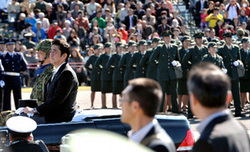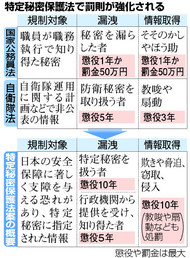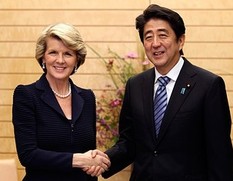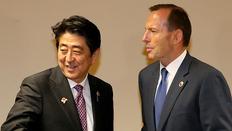 Source: asahi.com
Source: asahi.com As if to prove PM Abe’s point, on Monday four Chinese Coast Guard vessels entered the territory surrounding the Senkaku Islands, making it the 68th day in which Chinese government vessels have sought to enforce China’s claims to the islands (J). Moreover, on Saturday Japanese newspapers reported that two Chinese H6 bombers and two Y8 early warning aircraft had flown through the airspace over Miyakojima in Okinawa Prefecture on their way to PLAN exercises in the western Pacific, the fourth such incident involving Chinese aircraft along the Okinawan ‘first defence line’ and which prompted ASDF F-15s to scramble to intercept them (J).
What all of this indicates is that PM Abe has seized an opportunity to convince regional members that with the US recently sidelined as a result of a deadlock in Congress, Japan is prepared to listen to their concerns regarding China’s approach to territorial issues and provide them with a strong backer should they choose to confront China over its conduct. By reassuring ASEAN, whom PM Abe sees as a collective whose influence could further boost Japan’s standing in the region, PM Abe also gave the US an opportunity to re-gather its focus on Asia by emphasising the necessity of a US presence in the region and offering Japanese support for the forward deployment of US military assets.
This pro-active diplomacy also signals that Abe is determined to ensure that Japan is not rolled by China in relation to its territorial ambitions. With Japan offering assistance and investment, ASEAN will, in Abe’s mind, see the benefits of working the Japan for mutual profit and devoid of any overarching security issues. In return, ASEAN could then offer its support to Japan as Japan continues to try to gain a permanent seat on the UNSC, as well as giving Japan greater influence across the Indonesian archipelago right up to the Chinese border.
China’s bellicose response to PM Abe’s comments also gives Abe the ‘ammunition’ he needs to further promote the argument for a stronger, more flexible arrangement for Japan’s defence forces, with an emphasis on greater capabilities to counter any attempt by China (or South Korea) to seize Japanese territory (such as the creation of a dedicated marine force, a greater use of amphibious vehicles, and a dramatic expansion in Japan’s submarine fleet). Aware that any emphasis by the Japanese government on defence will raise concerns among other nations in the region, PM Abe has been busily shoring up his personal relationships with leaders around the Asia-Pacific and further abroad, assuring them of Japan’s benign intentions and desire for all to operate in accordance with international law (of which Japan has a strong record). Abe has, in other words, been outmanoeuvring China’s leadership in the ‘meet-and-greet’ stakes, forging links with other leaders to ensure that they will have a sympathetic ear in Tokyo in contrast to the silence that they will receive from Beijing.
By making such statements as that mentioned above, it may be said that PM Abe is unnecessarily provoking China, and placing Japan at risk by approving the use of force against any incursion into what Japan considers its territory. Yet Abe has seen that there is genuine concern in the region regarding China’s intentions, and that any attempt to mollify China or suggest compromise is met with indifference or hostility from Beijing. Abe is therefore testing the waters, soliciting comments from China’s political and military organs that reveal their intentions without outright condemning China’s leadership. It reinforces the image of Japan as a benign power, prepared to act if its sovereignty or the stability of the region is threatened, but not actively seeking confrontation. As China has yet to clarify its intentions, Abe has assigned intentions to China that China either confirms through its rhetoric or denies by remaining silent. It is an astute act of diplomacy, and a credit to Abe’s political guile.




 RSS Feed
RSS Feed